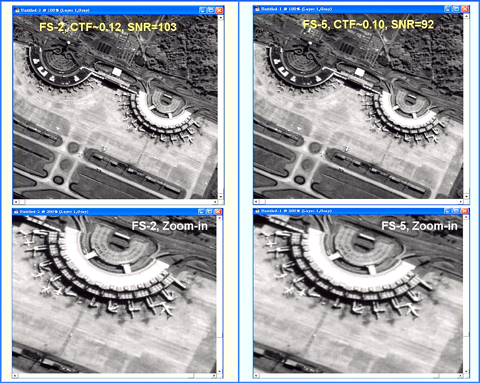The National Space Organization (NSPO) said yesterday that a critical sensor module in its satellite program would be built by a Taiwanese corporation, in keeping with its policy of developing domestic space-related industries.
The decision marked a switch by the organization, which has traditionally relied on more mainstream image sensors based on the tried-and-tested charge-coupled device (CCD) system.
Officials said the decision to abandon the system was made because of tighter export controls in the US and other countries on high-tech models used in military and satellite imagery.

PHOTO: TANG CHIA-LING, TAIPEI TIMES; ORIGINAL IMAGES COURTESY OF
Previous satellite launches by the government-run organization have all utilized the CCD system, which is used to process images shot from space and downlink them to servers based in Hsinchu.
The new satellites are expected to use sensors based on complementary metal oxide semiconductors (CMOS), a technology that officials said Taiwan’s manufacturing industry currently dominates.
They said the image quality of the technology, which has lower power requirements, has caught up with that of the CCD since the development of active pixel sensor (APS) technologies.
The technology was praised by NSPO vice director Chang Guey-shin (張桂祥), who is also head of the satellite program.
He said a primary focus of the multi-million dollar programs was also to upgrade domestic enterprises.
FORMOSAT-5 will mark the formal beginning of the “second phase” in satellite development, the NSPO said.
While the first phase was marked by overseas procurement, the second phase would emphasize indigenous development of critical technologies, including spacecraft bus and optical remote sensing instruments.
The new satellite is expected to include components from domestic corporations and research institutions, officials said.
While the CMOS sensor will be supplied by Taoyuan-based CMOS Sensor, other areas, including lens assembly, will be handled by the Aerospace Industrial Development Corp.
Overall module performance has been consistent in tests with samples from the CCD-equipped FORMOSAT-2 satellite and exceeded the older sensor in several lighting conditions, Chang said.
“It showcases that our domestic capabilities have the potential to lead the world,” he said.
Officials said the sensor module included in the FORMOSAT-5 will primarily be used to monitor the environment of Taiwan and its surrounding shorelines.
It will be an extension of FORMOSAT-2, which fulfilled its five-year mission last May.
The organization said that there was an 80 percent to 90 percent chance of success, with the risk of failure coming from untested technology and structural risks.
Speaking to reporters yesterday, state-funded National Applied Research Laboratories president Chen Wen-hwa (陳文華) said that if the mission proved to be a success, it would have enormous implications for the development of the nation’s space program.
“We could soon see a [satellite] launch every one or two years due to the upgrading of our domestic technologies,” Chen said. “Success here … could increase our standing in the world.”
The estimated launch date for the satellite is currently pegged at 2013, although officials said this could change pending further testing.
The satellite is expected to orbit at an altitude of 720km with an operating lifespan of five years.

Taiwan is to have nine extended holidays next year, led by a nine-day Lunar New Year break, the Cabinet announced yesterday. The nine-day Lunar New Year holiday next year matches the length of this year’s holiday, which featured six extended holidays. The increase in extended holidays is due to the Act on the Implementation of Commemorative and Festival Holidays (紀念日及節日實施條例), which was passed early last month with support from the opposition Chinese Nationalist Party (KMT) and Taiwan People’s Party. Under the new act, the day before Lunar New Year’s Eve is also a national holiday, and Labor Day would no longer be limited

Taiwan is to extend its visa-waiver program for Philippine passport holders for another year, starting on Aug. 1, Minister of Foreign Affairs Lin Chia-lung (林佳龍) said on Friday. Lin made the announcement during a reception in Taipei marking the 127th anniversary of Philippine independence and the 50th anniversary of the establishment of the Manila Economic and Cultural Office (MECO) in Taiwan, the Ministry of Foreign Affairs said. The decision reflected Taiwan’s commitment to deepening exchanges with the Philippines, the statement cited Lin as saying, adding that it was a key partner under the New Southbound Policy launched in 2016. Lin also expressed hope

Costa Rica sent a group of intelligence officials to Taiwan for a short-term training program, the first time the Central American country has done so since the countries ended official diplomatic relations in 2007, a Costa Rican media outlet reported last week. Five officials from the Costa Rican Directorate of Intelligence and Security last month spent 23 days in Taipei undergoing a series of training sessions focused on national security, La Nacion reported on Friday, quoting unnamed sources. The Costa Rican government has not confirmed the report. The Chinese embassy in Costa Rica protested the news, saying in a statement issued the same

Temperatures in New Taipei City’s Sindian District (新店) climbed past 37°C yesterday, as the Central Weather Administration (CWA) issued heat alerts for 16 municipalities, warning the public of intense heat expected across Taiwan. The hottest location in Taiwan was in Sindian, where the mercury reached 37.5°C at about 2pm, according to CWA data. Taipei’s Shilin District (士林) recorded a temperature of 37.4°C at noon, Taitung County’s Jinfeng Township (金峰) at 12:50 pm logged a temperature of 37.4°C and Miaoli County’s Toufen Township (頭份) reached 36.7°C at 11:40am, the CWA said. The weather agency yesterday issued a yellow level information notice for Taipei, New